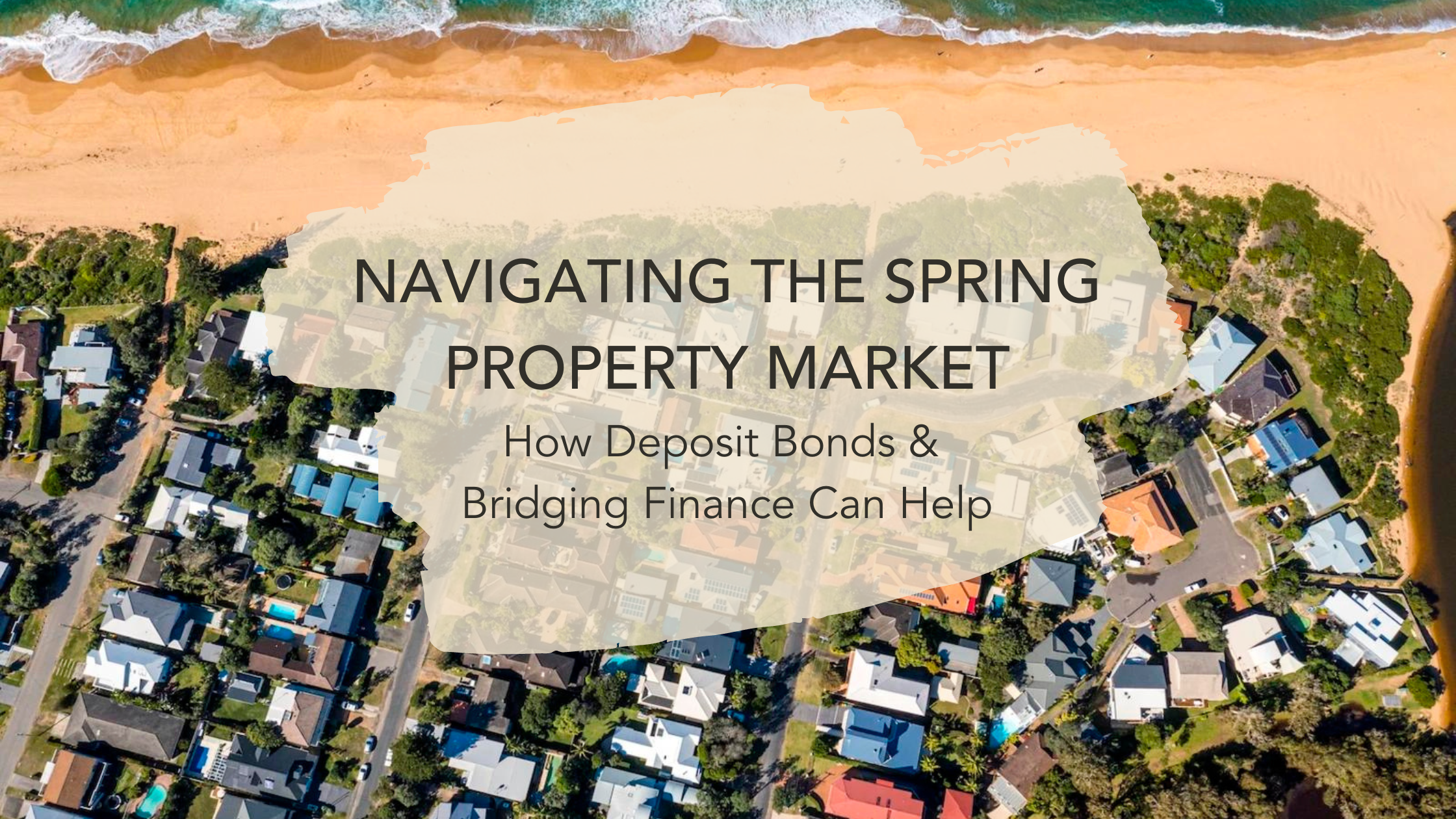How Deposit Bonds and Bridging Finance Can Help You Stay Ahead in a Hot Market
As spring arrives and the property market begins to bloom, a shortage of properties, intensified by strong population growth, is set to drive up prices and rents. For buyers eager to enter the market quickly and not miss out, aligning the timing of selling and buying can be challenging.
The solution? Deposit bonds and bridging finance. These options offer flexibility and can streamline your path to securing a new home before selling your current one.
The Challenges of Buying and Selling in a Busy Market
Spring often sees an influx of properties hitting the market, making it an opportune time for buyers and sellers alike. However, with increased competition and the pressure to act quickly, timing can become a significant hurdle. You might find your ideal new home before your current property is sold, or conversely, you might secure a buyer for your current home before you’ve found a new one. This is where financial tools like deposit bonds and bridging finance can offer practical solutions.
What is a Deposit Bond?
A deposit bond acts as a substitute for the cash deposit required when purchasing a property. Typically, when you buy a home, you’re required to put down a deposit—often 10% of the purchase price. A deposit bond allows you to provide a guarantee instead of an upfront cash deposit. This can be particularly useful if your funds are tied up in your existing property or other investments.
Benefits of Using a Deposit Bond:
No Need for Immediate Cash: With a deposit bond, you don’t need to have liquid cash ready for the deposit. This can be particularly helpful if your cash is tied up in other assets, like your current home or shares.
Flexibility and Convenience: Deposit bonds are flexible and can be used for various types of property purchases, including residential, commercial, and off-the-plan properties. This flexibility makes them a convenient option for many buyers.
Facilitates Quick Action: In a competitive market, being able to act quickly is crucial. A deposit bond allows you to make an offer on a property without having to wait for your current property to sell or for funds to clear.
Cost-Effective: Typically, the cost of a deposit bond is lower than the interest and fees associated with short-term loans or withdrawing from investment accounts, making it a cost-effective solution.
What is Bridging Finance?
Bridging finance is a short-term loan that helps you cover the gap between buying a new property and selling your current one. It essentially “bridges” the financial gap, giving you the freedom to purchase your next home before you’ve sold your existing property. This type of finance can be invaluable in a fast-moving market, where securing your next home quickly can be the difference between success and disappointment.
Benefits of Using Bridging Finance:
Seamless Transition: Bridging finance allows you to buy your new home before selling your old one, providing a seamless transition between properties without the stress of having to sell first.
Avoid the Need for Temporary Housing: One of the biggest challenges when there’s a timing mismatch between selling and buying is the potential need for temporary accommodation. Bridging finance eliminates this worry, allowing you to move directly from one property to the next.
Greater Flexibility: You don’t have to rush the sale of your current property. With bridging finance, you have the flexibility to wait for a better offer, ensuring you get the best possible price for your home.
Reduce Financial Stress: Knowing you have the funds to cover your new purchase, even if your current home hasn't sold, reduces financial stress and allows you to focus on finding the right property.
How to Use Deposit Bonds and Bridging Finance
Assess Your Needs: Determine whether a deposit bond or bridging finance (or both) best suits your situation. If you need to act quickly and don’t have immediate access to liquid cash, a deposit bond might be ideal. If you’re looking to buy a new property before selling your current one, bridging finance could be the right choice.
Consult with a Financial Adviser or Broker: Before committing to either option, speak with us to understand the costs, risks, and benefits associated with each option. Get the right guidance to help you make the best decision for your situation.
Plan Your Finances: Ensure you have a clear understanding of your financial position, including the costs involved in buying, selling, and any loan repayments. Make sure you have a plan for managing these costs effectively.
Get Pre-Approved: If you’re considering bridging finance, get pre-approved for a loan amount based on your current property’s value and the estimated value of the new property. This will give you a clear idea of your borrowing capacity and help you plan accordingly.
Act Strategically: Use the flexibility that deposit bonds and bridging finance provide to your advantage. Take your time to find the right property and negotiate the best possible deal, knowing you have the financial backing to make a competitive offer.
Conclusion
Spring is a vibrant time in the property market, full of opportunities for buyers and sellers alike. By understanding and utilising tools like deposit bonds and bridging finance, you can navigate the complexities of buying and selling with greater ease and confidence. Whether you're looking to move quickly or need a little more time to find the perfect home, these financial solutions can help you make the most of the season's opportunities.
Contact Us Today to learn more about how deposit bonds and bridging finance can work for you.
Let us help you step confidently into the spring property market with a strategy that suits your needs.
Sally Prowse
Director
Ph: 0400 570 051
Email: sally@sandcastlefinance.com.au
Camilla Bowhill
Finance Broker
Ph: 0403 852 733
Email: camilla@sandcastlefinance.com.au
Michelle Russell
Mortgage Broker, MFAA
Ph: 0493 994 160
Email: michelle@sandcastlefinance.com.au




